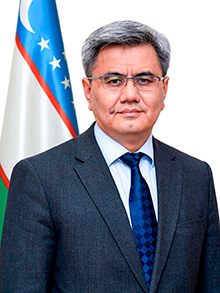
Cultural Heritage of Karakalpakstan  Karakalpakstan has a unique and rich cultural heritage. It includes ancient architectural and archaeological monuments, unique folklore, performing arts, ceremonies and customs, as well as traditional handicrafts.
Karakalpakstan has a unique and rich cultural heritage. It includes ancient architectural and archaeological monuments, unique folklore, performing arts, ceremonies and customs, as well as traditional handicrafts.
The territory of Karakalpakstan is rich with architectural and archaeological monuments, most of which are defensive constructions, including a number of impressive fortresses along the borders of settlements. The majority of the earliest constructions date back to the IV century B.C., when Ancient Khorezm freed itself from the Achaemenid Empire.
READ MORE
- EGF Editor |
Published on EGF: 20.03.2024
| Markets
-
Eco-Tourism in Uzbekistan: A Journey Towards Sustainability  In the heart of Central Asia, Uzbekistan, a country known for its dazzling architecture and rich history, is emerging as a promising eco-tourism destination.
In the heart of Central Asia, Uzbekistan, a country known for its dazzling architecture and rich history, is emerging as a promising eco-tourism destination.
Eco-tourism in Uzbekistan presents an opportunity to explore the country’s natural beauty while contributing to its sustainable development. As more travelers seek out eco-friendly travel options, Uzbekistan stands as a testament to the power of eco-tourism to transform not just the landscape, but also the lives of the people who call it home.
READ MORE
- EGF Editor |
Published on EGF: 14.03.2024
| Markets
-
MIIT: In Uzbekistan, the implementation of 7,656 projects with a total value of $11.6 billion is planned in 2024  One of the key principles of Uzbekistan's economic growth is the widespread and parallel regional development, based on a deep analysis of the socio-economic situation of the country’s regions, including the study of resource base, production, transport-logistics potential, and demand for various high-value-added products.
One of the key principles of Uzbekistan's economic growth is the widespread and parallel regional development, based on a deep analysis of the socio-economic situation of the country’s regions, including the study of resource base, production, transport-logistics potential, and demand for various high-value-added products.
According to the Ministry of Investment, Industry and Trade, based on the analysis results, regional investment programs (RIP) are formed annually and approved by the Government Commission, implemented with the coordination and support of the Ministry of Investment, Industry, and Trade of the Republic of Uzbekistan. Considering the identification of new opportunities, the list of projects expands throughout the year.
READ MORE
- EGF Editor |
Published on EGF: 27.02.2024
| Markets
-
As of January 1, 2024, 766 industrial zones have been created in Uzbekistan  Ministry of Investment, Industry and Trade: In 2023, enterprises located in industrial zones manufactured products totaling 53.4 trillion soums and exported $972 million.
Ministry of Investment, Industry and Trade: In 2023, enterprises located in industrial zones manufactured products totaling 53.4 trillion soums and exported $972 million.
In 2024, 841 projects are planned to be launched in industrial zones in Uzbekistan.
In recent years, the country has been implementing a number of consistent, irreversible reforms aimed at creating an open, competitive economy, investment and industrial development, expanding foreign trade relations, and creating an attractive business environment for domestic and foreign investors.
READ MORE
- EGF Editor |
Published on EGF: 24.02.2024
| Markets
-
The Groundwork of Economic Reforms in 2024. On the situation in the economy and the tasks set  Obid Khakimov, director of the Center for Economic Research and Reforms under the Administration of the Republic of Uzbekistan
Obid Khakimov, director of the Center for Economic Research and Reforms under the Administration of the Republic of Uzbekistan
The dynamic growth of the population of Uzbekistan requires at least high outstripping economic growth rates in order to adequately meet the growing needs and improve the standard of living of people. But this requires new, more balanced and verified approaches to ensure timely achievement of the set goals.
And these new approaches to economic policy were clearly manifested in the decisions taken at the important meetings held at the beginning of the year under the chairmanship of the President of Uzbekistan Shavkat Mirziyoyev on the situation in the economy and the tasks assigned to the economic divisions for 2024.
READ MORE
- EGF Editor |
Published on EGF: 16.02.2024
| Markets
-
The Emerging Azerbaijan-Gulf Partnership in Energy
 By Fuad Shahbazov, Baku-based independent regional security and defence analyst
By Fuad Shahbazov, Baku-based independent regional security and defence analyst
On January 8, Mohammad bin Zayed Al-Nahyan (MBZ), the leader of the United Arab Emirates (UAE), paid an official visit to Azerbaijan upon the invitation of his counterpart, President Ilham Aliyev. While MBZ’s visit to Baku signaled an era of deepening economic and energy ties between Azerbaijan and the UAE, it also reflected significant progress made in recent years. Indeed, the bilateral relationship has seen a raft of new projects and investments, particularly in the renewable energy sector. Notably, according to 2022 data, the Gulf countries are now among Azerbaijan’s top investment partners, though reciprocal investment remains low, compared to Azerbaijan’s other partners. READ MORE
- EGF Editor |
Published on EGF: 30.01.2024
| Markets
-
How Russian Migration Fuels Armenia’s IT Sector Growth  By Benyamin POGHOSYAN, PhD, Chairman, Center for Political and Economic Strategic Studies
By Benyamin POGHOSYAN, PhD, Chairman, Center for Political and Economic Strategic Studies
The Russian invasion of Ukraine has led to a significant influx of Russian IT specialists into Armenia, boosting the sector and contributing to the country's economic recovery.
The growth of IT has become a synonym for Armenia’s development in the last decades. Given that the country has had a rather strong position in the IT sector since the collapse of the Soviet Union, it appears to be natural to observe the industry flourishing. In the 2000s, the primary agents of change were the branches of multinational companies, such as Synopsys Armenia and others. In recent years, the focus has shifted towards establishing a vibrant and thriving start-up ecosystem. Not even the economic slowdown in 2014-2016, the political upheavals of 2018, the Covid-19 Pandemic, and the 2020 war in Nagorno Karabakh did stop the growth of the IT sector in Armenia.
READ MORE
- EGF Editor |
Published on EGF: 13.11.2023
| Markets
-
From Mumbai to Varna via Armenia: The New India-Europe Route  By Benyamin POGHOSYAN, PhD, Chairman, Center for Political and Economic Strategic Studies
By Benyamin POGHOSYAN, PhD, Chairman, Center for Political and Economic Strategic Studies
The war in Ukraine has disrupted global supply chains, creating significant complications for transit routes crossing the Russia-Europe border. The world economy, still reeling from COVID-19, found itself in another crisis. Yet, even before the pandemic and the war in Ukraine, the primary sea transit routes connecting Southeast Asia with Europe, like the Suez Canal, were congested due to the growing cargo volumes. As one of the rising stars of the global economy, India was looking forward to establishing alternative routes to reach Europe. In 2000, India, Iran and Russia signed an agreement to launch the International North-South Transport Corridor (INSTC) to connect India with Europe via Iran and Russia. Three main routes were identified to connect India with Russia: via Iran and Azerbaijan, via Iran and the Caspian Sea and via Iran-Turkmenistan-Kazakhstan. According to the initial plan, the cargo should enter northern Europe from Russia, creating an India-Europe route that circumvents the Suez Canal. READ MORE
- EGF Editor |
Published on EGF: 10.03.2023
| Markets
-
The Rising Significance of the Middle Corridor  By Vusal GULIYEV, Visiting Research Fellow at the Asian Studies Center of Boğaziçi University
By Vusal GULIYEV, Visiting Research Fellow at the Asian Studies Center of Boğaziçi University
The Russo‑Ukrainian war has affected global container traffic flows more profoundly than any other recent crisis. A series of West‑led sanctions and export restrictions imposed on Moscow has forced logistics companies to avoid shipping consignments via Russia’s Northern Corridor. At the same time, the disruption of operations through the Trans‑Siberian transit line has opened up new avenues for wide‑ranging cooperation along the emerging Trans‑Eurasian transport and trade corridors. The current geopolitical situation in Eastern Europe gives an additional impetus to what countries like Türkiye officially call the Trans‑Caspian East‑West‑Middle Corridor Initiative as well as to a set of containerized rail freight transport networks that traverse Central Asia, the South Caucasus, and Anatolia whilst circumventing Russian territory. This alternative multimodal cross‑regional path—widely known as the Trans‑Caspian International Transport Route (TITR)— could help ease current logistics woes and begin a new chapter in terms of interconnectivity across the Euro‑Asian transportation networks, as global freight flows struggle to pick up speed in the wake of heavy economic sanctions on Kremlin.
READ MORE
- EGF Editor |
Published on EGF: 11.01.2023
| Markets
-
